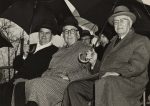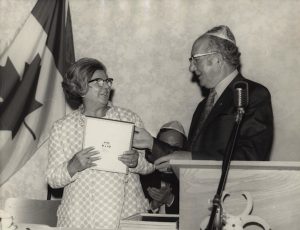Ryan Bellerose, left, in Jerusalem with Michael Dickson of Stand With Us. (photo from Ryan Bellerose)
Ryan Bellerose is not the first Métis to stand with Israel, though he might end being one of the most influential, as he works to increase B’nai Brith Canada’s presence and advocacy voice in Alberta and British Columbia.
Based in Calgary, Bellerose became BBC’s advocacy coordinator for Western Canada just over four months ago. Like many Métis of his generation, he was raised Roman Catholic but, later in life, found his way back to indigenous spirituality and decided that Catholicism was not for him.
“I try to worship the creator the way Cree people do, rather than the way white people do,” he told the Independent.
Growing up, Bellerose read about Israel and felt a kinship with Israelis insofar as the struggles they have endured concerning their ancestral land and rights. The Métis here in Canada have had less success with similar struggles, he said.
That’s how his connection to Israel started, said Bellerose. “On top of that, on my mother’s side, my great-grandmother was really pro-Israel. She grew up in Norway during WWII. She was very pro-Israel, because she was very anti-Nazi Germany.
“She would drink Manischewitz wine everyday at 4 p.m. As a kid, I asked her one time why she drinks it, because she’d always make a face when drinking it. She told me, ‘I drink this because it shows the world that the Jews didn’t die and that the Nazis lost.’”
It would not be until Bellerose was in university that it became clear in his mind why he, himself, was pro-Israel. A Jewish friend at the University of Alberta helped him see just how similar the Métis and Jewish narratives are.
“I didn’t realize she was Jewish and I used to hang out with her a lot,” recalled Bellerose. “She’d always invite me over for dinner at her house on Friday. They weren’t super-observant Jews, but they still lit candles and had Shabbat dinner. They didn’t eat meat on Friday … all things that my family did, too. So, I just thought that they were super-Catholics, and I told my grandma that my friend is totally super-Catholic and that she’d love this girl.”
What Bellerose did not yet realize at the time was that his friend was being bullied at the U of A to a degree he had never seen before. Growing up in northern Alberta, Bellerose had experienced a lot of racism and prejudice, but nothing, he said, like these verbal attacks on his friend.
“What was a shock to me was this girl – blond-haired, blue-eyed, who played on sports teams and was super-smart academically – was being bullied to the point that she was considering suicide,” said Bellerose. “We’d be walking across the quad at the U of A and someone would yell, ‘Baby killer!’ I just always assumed they must be yelling at someone else or maybe even yelling at me, because there’s no way they would be yelling at her.”
This occurred a few times before Bellerose learned that his friend had participated in several pro-Israel events and that it was some very anti-Israel U of A students who were shouting such slurs at her.
“It’s one of those things that … it’s very difficult for a rational, moral human being to even wrap their heads around…. I think that’s why a lot of Canadians don’t understand the depth of this,” said Bellerose.
“It’s simply because she used to wear an IDF T-shirt and she was Jewish. So, I mean, the excuse would be anti-Zionism, but the truth is that it is antisemitism.
“I’m supposed to be one of her close friends and, yet, I had absolutely no idea what she was going through. I should be more sensitive than that as a Métis person who has experienced that kind of thing. It really bothered me that I didn’t see it. That was when I decided that I’m not going to stand there and be quiet when this kind of stuff happens.”
Soon after, in 2002, Bellerose was on his way to his football locker when he encountered an “apartheid wall” in his way. It was made out of papier-mâché and cardboard, and had bloody handprints on it. As the wall was blocking his way, Bellerose asked politely if they could move it. A female student responded to him, “Now, you understand the persecution the Palestinians deal with on a daily basis.”
Bellerose said, “I looked at her and said that my [Métis] people were still allowed to be killed in 1939 in Canada … that nobody will do anything about that … so don’t lecture me about oppression. I lost my cool with her and said that they should either move the wall or I would. They didn’t, so I walked over and ripped it down. I was angry, so I flipped their table over. They had a bucket of propaganda and I kicked that over.”
Fast-forward about 10 years, and Bellerose has joined Calgary United with Israel. He began his involvement helping organize events on a volunteer basis, while working full-time. During his spare time, he would argue with antisemites in comment sections of published articles, but eventually realized that he would be able to get his message out a lot more quickly if he educated influential people instead, on both sides of the conflict.
Bellerose said many people in the world, out of ignorance, believe that the Palestinians are on the side of complete right in the conflict, painting Jews as occupiers as opposed to people returning to their homeland.
“That’s literally how this whole idea that the Palestinians are the native people and the Jews are the white European colonizers came about…. That’s how it was spread so easily,” said Bellerose. “Arabs flipped that narrative…. If I allowed the argument that the Arabs are indigenous to the land of Israel, then I might as well turn around and say that white people are now indigenous to Canada. A lot of native people don’t understand that until you literally put it into those terms.”
Bellerose has a fairly significant following on social media, partly because he used to play football and partly because he is a sometimes controversial personality who makes people uncomfortable. B’nai Brith Canada began following Bellerose, too, and was especially impressed with his imploring Jews to be proactive in their advocacy and unapologetic.
“I firmly believe that the biggest part of this problem is that, a lot of times, until recently, Jewish advocates were kind of taught not to talk about the settlements,” said Bellerose. “I’m here to talk about the good things about Israel. Of course, the truth is there’s a lot to criticize – but there’s so much more to be proud of.”
When BBC hired Bellerose, he could hardly believe he would be paid to do what he loves doing and would do anyway.
“I tell people that I’m going to be more professional, swear a little less,” he quipped regarding his role with BBC. But, he added, B’nai Brith itself has become “less apologetic, more proactive … a little more in your face.”
Bellerose especially likes working with young adults, as he strongly believes there are many young people who are not connected with their identity because they don’t really understand it.
Bellerose is also working hard to build bridges between aboriginals and Jews. “I think that, by building these bridges, eventually we can help you and you can help us, and it will make the world a better place,” he said. “This is best done through what I call ‘relationship advocacy.’ Instead of going out and telling everyone how wonderful Israel is and how wonderful Jews are, I think it works much better when Jewish people invite somebody for Shabbat. The moment they see you as a human being and not an abstract concept, you build a relationship with that person. And, when that person has a relationship with you, they are way more likely to stand up for you, way more likely to actually get involved.”
Rebeca Kuropatwa is a Winnipeg freelance writer.









